Você consegue imaginar um mundo onde os atrasos nas cargas sejam coisa do passado?
O agenciamento de carga tradicional depende muito de processos manuais e de tomada de decisão humana, e isso vem acompanhado de possíveis problemas como subjetividade, erros e análise limitada de dados em tempo real.
Avançando para agora, a era da IA, onde usamos a tecnologia para melhorar muitos aspectos de nossas vidas. Compreender como a IA está a revolucionar a indústria do transporte de mercadorias e a melhorar a sua eficiência significa que pode preparar-se para o transporte de mercadorias do futuro.
Operações de frete tradicionais
Historicamente, a gestão de frete sempre dependeu de tarefas manuais que exigem muita mão de obra.
Caneta e papel.
Um cliente que necessite transportar mercadorias de A para B procurará uma transportadora para fazer o envio físico ou trabalhará com um despachante que ajudará a organizar os diversos elementos logísticos do processo.
Para que a carga seja entregue, os envolvidos precisarão realizar tarefas manuais como;
- Planejando a rota. Os despachantes aconselham os clientes sobre a melhor e mais econômica combinação de rota e transportadora para transportar suas mercadorias com base na experiência e na intuição.
- Processando papelada. Os expedidores ou despachantes devem garantir que a documentação alfandegária e qualquer outra documentação necessária, como licenças e certificados, sejam preenchidas de forma clara e correta.
- Agendamento e despacho de viaturas através de plataformas online e chamadas telefónicas.
- Rastreamento de remessas. Fornecer visibilidade das remessas por meio de rastreamento manual fornece informações limitadas aos remetentes e exige muita mão de obra.
Existem muitos desafios associados à forma tradicional de gestão de frete.
Os maiores problemas? Vamos dar uma olhada…
Erro humano
O erro humano e a subjetividade na tomada de decisões estão no topo da lista de questões convencionais de gestão de frete.
Falta de controle
Os processos de encaminhamento convencionais não oferecem muito controle para o despachante ou para o cliente, uma vez que a remessa sai de seu destino. Com a falta de insights de dados em tempo real e sem olhar para a carga durante toda a viagem, os tempos de reação são lentos. Isto significa que a comunicação falha, os clientes ficam confusos e desapontados e a reputação pode estar em risco.

Processos lentos
A maneira como sempre foi feito é extremamente lenta. Desde a obtenção de uma cotação até o pagamento e a classificação da documentação, o gerenciamento manual de frete funciona a passo de lesma em comparação com o encaminhamento assistido digitalmente.
Tanta papelada
Manter o controle de toda a documentação necessária durante a jornada de uma remessa é demorado, sem mencionar a garantia de que toda ela seja preenchida corretamente. E sem ele, sua remessa poderá atrasar ou ser recusada.
Muitos cozinheiros
São necessários vários intermediários para o agenciamento de carga convencional, o que não só significa gastar mais, mas também pode afetar negativamente a comunicação e as mensagens podem ficar confusas.
A revolução da IA nas operações de frete
Você deve estar se perguntando o que exatamente a IA pode fazer pelo frete e pela logística. Se você for um despachante, como isso melhorará o serviço que você pode oferecer? Se você for um remetente, que impacto verá?
Aqui está uma olhada no que a IA tem a oferecer ao mundo do frete.
Otimizando Rotas e Agendamento
Os algoritmos de IA podem analisar grandes quantidades de dados para criar rotas de transporte ideais que consideram fatores como tráfego, clima e eficiência de combustível.
Em essência, isso significa que suas mercadorias chegarão ao destino mais rapidamente. Mas não apenas isso. Eles também correrão menos risco de atrasos ou danos, e você poderá economizar dinheiro e proteger o planeta aproveitando as opções ecológicas.
Manutenção preditiva
Este vai direto para a mecânica do frete – as máquinas que usamos para levar as coisas onde elas precisam estar.
A IA pode analisar dados de sensores de veículos e equipamentos para prever possíveis problemas de manutenção, evitando quebras e atrasos.
Manter as máquinas que fazem parte da infraestrutura do setor de transporte de forma mais eficiente significa que o transporte é mais confiável e o processo permanece mais ecológico, emitindo menos carbono na atmosfera. Também se economiza dinheiro, que pode ser repassado ao longo da cadeia, permitindo que todos se beneficiem.
Armazenagem e operações automatizadas
A IA atende a todos os elementos do gerenciamento de frete, até mesmo a coleta, embalagem e classificação. Robôs alimentados por IA e automação em tarefas de gerenciamento de armazém simplificam processos, reduzem fortemente o risco de erro e economizam custos de mão de obra.

Visibilidade e rastreamento aprimorados
Os clientes podem se beneficiar de um rastreamento preciso em tempo real com assistência de IA.
A IA pode analisar dados em tempo real para fornecer rastreamento preciso de remessas e melhorar a visibilidade da cadeia de suprimentos, permitindo a resolução proativa de problemas e o planejamento atualizado.
Previsão de demanda e gerenciamento de estoque
A IA pode analisar dados históricos e tendências de mercado para prever a procura futura de bens, permitindo níveis de inventário otimizados e redução de rupturas de stock. Os dados históricos incluirão épocas importantes do ano, como o Ano Novo Chinês, o Natal, a Páscoa e a correria do regresso às aulas; você não precisará se lembrar de todas as complexidades do gerenciamento manual de frete.
Automação de papelada e manuseio de documentos
Aqui está um que a equipe gostou! A IA pode automatizar tarefas como processamento de documentos, desembaraço aduaneiro e contratos de frete. Todo esse tempo que gastamos processando documentos foi economizado. A economia de tempo nesta área administrativa significa que os membros da equipe podem se envolver mais com as questões práticas, porque a IA está apoiando o lado burocrático. Ufa!
Benefícios da IA para remetentes
Se ainda não estiver claro, deixe-nos explicar como a assistência de IA beneficiará nossos clientes.
Maior eficiência
A IA torna as coisas mais rápidas. Fim do. Sem escrita à mão para decifrar, dados históricos extraídos com o clique de um botão, planejamento de rotas baseado em dados... O que mais você poderia querer?
Mais direto
Todo o processo de gestão de frete é planejado e gerenciado mais facilmente com a ajuda da IA, e menos pessoas precisam estar envolvidas, agilizando a comunicação e a logística complexa.
Custo reduzido
Dos administradores ao pessoal do armazém, são necessárias menos pessoas para executar tarefas relacionadas com o frete. A IA também ajuda a manter máquinas e veículos, e a economia de custos de ambos os fatores reduz-se à economia para o expedidor. E, claro, a IA otimizará sua combinação rota/transportadora, garantindo que você obtenha o melhor negócio.
Menos erros
Mesmo o expedidor ou despachante mais profissional comete erros ocasionalmente. Afinal, somos humanos.
Usar IA para auxiliar no processo de gerenciamento de frete reduz fortemente o risco de erro. Coisas como problemas de papelada e discrepâncias de peso são coisas do passado graças à IA, pois ela pode identificar possíveis problemas com uma remessa antes do envio.
Visibilidade
O rastreamento assistido por IA significa que você pode gerenciar seu fluxo com mais precisão, minimizando atrasos e mantendo todos informados.
Alertas de clientes
A capacidade de rastreamento padrão ouro significa que os clientes são avisados sobre quaisquer problemas na velocidade da luz. Com o conhecimento em mãos, os remetentes podem empregar tempos de reação rápidos e resolver os problemas rapidamente.
Remessas mais ecológicas
Rotas de carga otimizadas = menor consumo de combustível. O mundo do transporte de mercadorias precisa de assumir a responsabilidade pelas suas emissões e, desta forma, você pode fazer a sua parte pelo planeta.
Comunicações Eficazes
Se você leu nosso blog recente sobre o assunto, saberá tudo sobre a importância da comunicação eficaz entre um despachante e um expedidor. Os chatbots de IA melhoram a velocidade e os detalhes das comunicações para todas as partes envolvidas, garantindo que todos tenham as informações de que precisam, quando precisam.
O caminho a seguir com IA no frete
Alguns desafios potenciais acompanham a adoção da IA na indústria de frete, e será na navegação por eles que compreenderemos o verdadeiro valor da IA.
- Custos de investimento inicial. Soluções personalizadas de IA podem custar muito dinheiro para serem desenvolvidas e implementadas.
- Treinamento de força de trabalho. Para muitos, pode ser difícil se acostumar com a tecnologia em si, muito menos com uma solução de IA inteligente e autossuficiente. Fazer com que todos participem e se atualizem sobre como tudo funciona é uma tarefa enorme.
- A curva de aprendizado. A implementação de uma solução de IA personalizada pode levar tempo. Requer muito monitoramento, entrada de dados, preparação e experimentação para garantir que todos os aspectos da gestão de frete sejam tratados. Especialmente se for um projeto totalmente novo.
No entanto, mesmo com estes bloqueadores em mente, a IA criará um ecossistema de transporte de mercadorias mais eficiente, sustentável e económico, pelo que os benefícios são abundantes (e superam em muito quaisquer aspectos negativos).
A IA está transformando a indústria de frete
A revolução da IA está aqui e a sua integração no sector do transporte de mercadorias é rápida e furiosa. Desde fretes mais rápidos até análises em tempo real, a IA está ajudando a orientar as decisões de compra dos expedidores em todo o mundo.
Procurando um despachante amigável que esteja adotando a IA para oferecer um serviço excepcional aos seus clientes? Você os encontrou. Entre em contato com a Millennium hoje mesmo.

